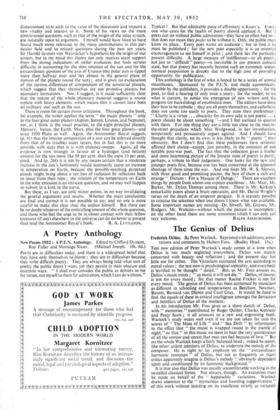A Poetry Anthology
New Poems 1952: A P.E.N. Anthology. Edited by Clifford Dyment, Roy Fuller and Montagu Slater. (Michael Joseph. 10s. 6d.) POETS are in difficulties today, and there is a widespread belief that they have only themselves to blame ; they are in difficulties because they write difficult poetry. They are always being told what sort of poetry the public doesn't want, yet they persist in their obscure and eccentric ways. " I shall ever consider the public as debtors to me for verses, not myself to them for admiration, which I can do without."
Typical 1 But that admirable piece of effrontery is Keats's. Ever). one who cares for the health of poetry should applaud it. But if poets can do without public admiration—they have so often had to___ that does not mean they prefer to be without it. Only, the public must know its place. Every poet wants an audience ; but to find it he must be published ; for the new poet especially it is an essential encouragement to see himself in print ; and there lies the particular present difficulty. A large measure of indifference—to all poetry, not just to "difficult" poetry—is inevitable in our present cultural state, but that poetry las recently become such an extremely uneco- nomical proposition is directly due to the high cost of providing opportunity for publication.
This anthology is the first of what is hoped to be a series of annual miscellanies. Sponsored by the P.E.N. and made economically possible by the publishers, it provides a double opportunity : for the poet, to find a hearing (if only once a year) • for the reader, to see what is current, to notice the emergence of new writers and the progress (or backsliding) of established ones. The editors have done their best to be catholic ; they are all poets themselves, and catholicity does not come too easily to poets. They state their preferences : " Clarity is a virtue ... obscurity for its own sake is not poetic ... a poem should be about something "—and I feel inclined to quarrel with them. For one thing they are a little too close to the man-in- the-street prejudices which Miss Wedgwood, in her introduction, temperately and persuasively argues against. And I should have thought that clarity, on its own, is less likely to be " poetic " than obscurity. But I don't find that these preferences have seriously affected their choice—except, just possibly, in the omission of one notable post-war poet. The fact that the collection gives a livelier and more heartening picture of the Imesent state of poetry is partly; perhaps, a tribute to their judgement. One looks for the new and younger poets first, because one has been concerned at the apparent shortage of them since the war. And one finds Mr. W. S. Merwin, with three good and promising poems, the best of them a rich and strange " Dictum : For a Masque of Deluge." There are excellent things by people from whom one expectsexcellence ; Mr. Muir, Mr. Barker, Mr. Dylan Thomas among them. There is Mr. Kirkup's remarkable poem about a brain operation, and Mr. David Wright's verses on the death of an emperor penguin. It is scarcely possible to criticise the selection when one doesn't know what was available. Some important names are missing—Dr. Sitwell, Mr. Graves, Mr. Rodgers, Mr. Watkins—without which the picture is incomplete ; on the other hand there are some omissions which I can only call










































 Previous page
Previous page